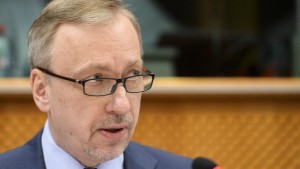Written by Bogdan A. Zdrojewski.
“Over the past 50 years, Europe has had many successes on the space market. The most recent example is the Rosetta satellite mission, which was tasked with entering into a comet’s orbit and releasing a module, which landed on its surface.

In the report I worked on in Parliament’s security and defence subcommittee, I drew special attention to this last element, which is often omitted.
The EU adopted its space strategy in 2007, and thanks to the treaty on the functioning of the European Union, it has competences in the creation and support of space policy.
The most important EU space programmes are the satellite navigation system Galileo and Earth observation system Copernicus. They both differ a great deal: the altitude, the life-span of the satellites, the tasks they undertake, as well as the level of implementation.
However, they are mutually compatible and together have a huge potential to ensure widely understood security in Europe.
Galileo is the world’s only entirely civil satellite navigation system. The US GPS system and Russia’s GLONASS, for example – the two biggest projects of this type – are military ventures.
However, Galileo can also be useful from security point of view. The creators of Galileo’s architecture foresaw services in the framework of public regulated service that will be available free of charge to governments and member states’ governmental agencies. Its signal will also be of use within the security sphere. In addition, this will take some pressure off GPS.
In recent times, this has experienced issues with proper timing, which could in turn lead to inaccurate positioning. This proves how important Galileo is, and not just within a European context. The whole system will be fully operational in 2020.
Copernicus, the second EU flagship system, offers other interesting and important capabilities. Its constellation of dedicated satellites, so called sentinels, will provide important observation information on changes in climate, border traffic, the maritime situation, humanitarian aid, or improving the quality of transport.
The data will be shared between a plethora of institutions, ranging from research institutes, meteorological stations to early warning agencies, or agencies preoccupied with migration. Some of these services are already being delivered by Copernicus.
Member states have long cooperating on space-related issues. Common initiatives, in a range of spheres, have been developed by the UK, France, German, Italy and Greece. Recently, the national space agencies of Poland, the Czech Republic, Romania and Hungary joined the ESA.
More and more European capitals are developing an interest in space technology, and its importance for economic growth, improving quality of life and security. Aside from purely European cooperation, we should also emphasise the need for closer and deeper cooperation with the US, including within the Nato framework. Their valuable experience can only benefit us.
My report also looks at future space technology strategies. These technologies must be included among priority initiatives when it comes to both research and development and security.
We must draw attention to the capabilities of European satellite systems in the new EU global strategy for foreign and security policy, which will be presented in June.
Long-term programming will also require proper budgetary planning. Ensuring continuous and adequate financing is a condition sine qua non for EU space programmes. These projects must also be properly advertised.
Their applications are many, but the usage level of their capabilities and services will depend on how they are promoted. One should not forget about an overall business picture. The space sector is largely dependent on institutional procurement.
The space race era was started by the governments of strong states. However, with time, the commercial use of satellite technologies has gained importance. In 2014, commercial launches constituted 25 per cent of all launches. As many as six out of 11 European launches were ordered by private companies.
World revenues from space activities reached €230bn in 2015, while global expenditure was at €73bn, demonstrating the economic potential of these technologies. Investing in them is simply good business.
I believe in European integration, so I am glad to see an added value in European ventures. Space technologies have the potential to improve the quality of life of all Europeans. We therefore cannot afford to waste its potential, or the funds that have so far been invested.”
About the author
Bogdan Andrzej Zdrojewski (EPP, PL) is European Parliament’s rapporteur on space capabilities for European security and defence
